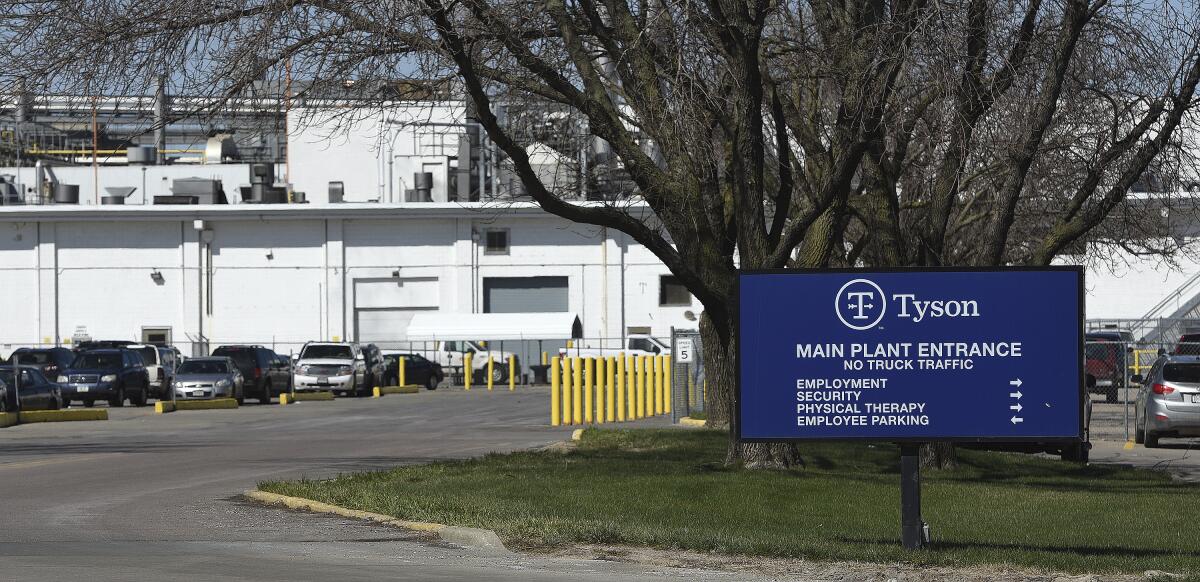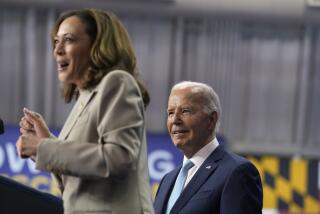Everything wrong with our food system has been made worse by the pandemic

- Share via
Last Tuesday, President Trump invoked the Defense Production Act to direct the Secretary of Agriculture to “take all appropriate action . . . to ensure that meat and poultry processors continue operations.”
Although technically the executive order neither forces plants to open nor compels workers to show up, it reveals the president’s utter disregard for plant workers who could face a high risk of contracting COVID-19 from workplaces contaminated with the coronavirus. According to the United Food and Commercial Workers International Union, more than 5,000 workers at meat processing plants have already been sickened, at least 20 have died, and more than 20 plants have had to close in recent weeks.
It is a cruel irony that Trump for so long refused to use the Defense Production Act to order production of lifesaving medical equipment, and now does it so readily to protect the multibillion-dollar meatpacking industry.
This executive order should come as no surprise. It is entirely consistent with the president’s many policies that harm immigrants and minorities. Most of these workers are people of color, and, according to the Government Accountability Office, about 28% are foreign-born. Many were recruited from abroad to take these jobs, which are low paying and dangerous even in the best of times.
Perhaps less obviously, the executive order is consistent with a troubling pattern in federal food law: the systemic disregard for the health and safety of workers. Federal food law prioritizes the interests of food consumers over those of food system workers. When food sickens consumers, the law on the books provides for aggressive action.
By contrast, when food workers are at risk, the federal government has a bad track record. From underenforced pesticide safety laws to inadequate protections from debt slavery and other forms of exploitation, the interests of food system workers come last. Before the pandemic, the Trump administration further weakened pesticide protection and relaxed laws governing line speed in meat processing plants. Faster production lines increase the risk of workplace injury. The federal government’s lax approach to protecting food system workers from COVID-19 continues this trend.
Trump’s executive order is also in keeping with a dangerous narrative that protecting the welfare of food systems workers will come at the cost of “feeding the nation.” Tyson Foods, which has closed seven plants in recent weeks, claims that it has a “responsibility to feed our country,” and that this is “as essential as healthcare.”
Indeed, food quantity and quality are critical components of public health. But Tyson’s argument has two fundamental flaws. First, from a public health perspective, promoting meat consumption should not be a top priority. Americans, on average, already eat significantly more meat than public health professionals recommend.
Second, Tyson sets up a false dichotomy that the Trump administration eagerly embraces. We do not need to choose between the safety of workers and the production of food.
As many supply chain experts have noted, we are not facing a food shortage in this country. Instead, as a result of social distancing orders, we are seeing specific breakdowns in the supply chain related to decreased institutional demand and increased consumer demand. For instance, while retail stores struggle to stock flour, plenty of bulk wholesale flour is available. While farmers dump produce that was destined for restaurants and schools, food banks fight to keep up with increased need.
These breakdowns could be corrected by swift intervention by the U.S. Department of Agriculture and state governments to use existing authority to purchase and redistribute food (the USDA has already come under fire for waiting critical months to begin to exercise this power). Any potential retail shortage of meat that may result from plant closures reflects a deeper problem in the structure of the food system: excessive consolidation.
A handful of meatpackers handle nearly all animal slaughter and processing, and each facility is essentially a regional monopoly. If a single plant closes, the farmers dependent on that plant may have no choice but to euthanize their animals. In the long term, a resilient meat supply chain requires breaking up these quasi-monopolies.
In the immediate crisis, the Centers for Disease Control and Prevention and the federal Occupational Safety and Health Administration have issued guidance identifying a variety of measures that could make these facilities safer. But adopting these measures, such as spreading out workers, installing physical barriers and staggering breaks, would be costly for the meatpacking industry, and OSHA has already made clear that the companies will have considerable independence in implementing the guidance.
The choice now is between worker safety and corporate profit. That choice should be easy, but the Trump administration keeps getting it wrong. In a time of cold-hearted decisions, this is one of the nastiest yet. The federal government should order meatpacking plants to carry out safety protocols, and, until they are fully in place, we can go without bacon.
Margot J. Pollans is a law professor at the Elisabeth Haub School of Law at Pace University, where she writes and teaches about food law.
More to Read
A cure for the common opinion
Get thought-provoking perspectives with our weekly newsletter.
You may occasionally receive promotional content from the Los Angeles Times.









